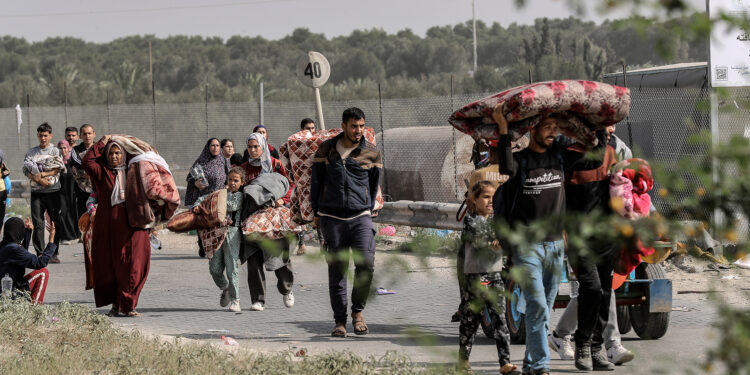When they arrived in the far south of the Gaza Strip, at the end of a 40-kilometre journey and followed the Israeli army’s orders step by step, the Orabi family received nothing but bombing in Rafah as well, and they began to feel that they no longer had any escape from the massacres, famine and thirst, “So where will we go now?” ?, asks the father of the family.
With this summary, La Croix newspaper concludes the story of the displacement of Muhammad Orabi’s family, which consists of a father, mother, and 7 children. Their father took them out of Jabalia, in the northern Gaza Strip, in search of safety in an area where there is no longer a safe place. Muhammad Orabi (45 years old) says, “We do not know whether We will live tomorrow.”
The story of the family’s displacement began when Muhammad Orabi left Jabalia, where he did not know when he would see it again. He said, “The bombing was continuous and the force of the explosions was unbelievable, so we were forced to leave.”
In Gaza City
The family traveled about 7 kilometers to settle in Gaza City with Muhammad Orabi’s sister, and there “among the children, cousins, and family, there were 25 people living in one room. There was nothing to eat, and no electricity to provide some light or heat. The Israeli army continued to bomb the city at night.” “And during the day.”
After the Israeli army dropped leaflets asking residents to “go south of Wadi Gaza,” and warning that “anyone who chooses to stay could be considered complicit with a terrorist organization,” “we all left toward the south on a donkey, with a cart this time instead of a car,” the father says.
Between children, cousins and parents, 25 people lived in one room. There was nothing to eat, no electricity to provide some light or heat, and the Israeli army continued to bomb the city day and night.
Muhammad, his wife, their three sons and four daughters, as well as his sister and her children, went out to the road. Muhammad says, “On the way, we passed through the occupation army checkpoints and were subjected to blackmail by the soldiers. This was the first time the children had seen tanks. It was very surprising and frightening,” and the man adds. He is still in a state of shock. “Some of them opened fire on the Palestinians in front of us, killing them.”
25 kilometers away, the family arrived in Khan Yunis, settling first in a school that served as a shelter for the displaced in the east of the city, before a relative received them in the west, where there was no place for the whole family, which forced them to separate, half of them in the house and the other half in a neighboring house.
Rafah, homelessness and disease
But after the short truce, the Israeli army invaded the south that had previously been presented as a safe place, and the Israeli army warned on December 1: “You must leave immediately for Rafah. The city of Khan Yunis is a dangerous combat zone. You have been warned.” Muhammad’s family was forced to take the road again towards the city of Rafah, the southernmost part of the Gaza Strip.
Rafah explodes. It now houses a million people after its population was about 200,000. There is no food, water, or electricity. Children have itchy skin and their hair is full of lice.
“For 3 days – says Muhammad – we wandered around looking for a place to settle down. We slept in the open air. Then a friend’s son lent us a room. We did not have a mattress and we were very crowded. I looked for a tent to give the children, who had been wearing the same clothes since the beginning of the war, space.” Bigger, but I couldn’t find one.”
“The city of Rafah was exploding with population,” says Muhammad. “It now houses a million people after its population was about 200,000. There is no food, no water, and no electricity. The children have itchy skin and their hair is full of lice. The situation is catastrophic. Wherever you go, you see the streets.” “Full of displaced people. All that remains for us is to pray for the war to end.”



